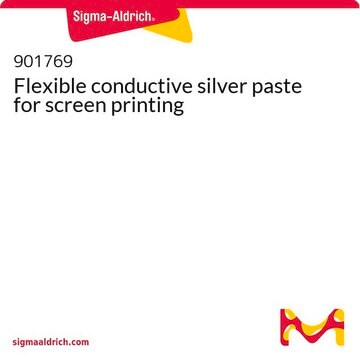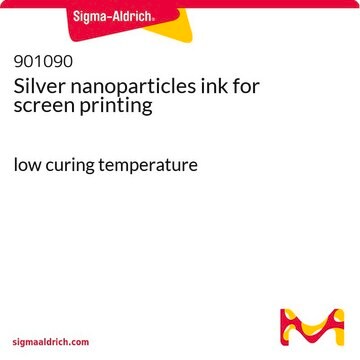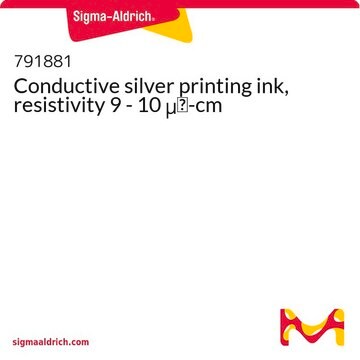735825
Silver
conductive paste
Synonym(s):
Silver Paste DGP80 TESM8020
About This Item
Recommended Products
Quality Level
form
paste (microparticles)
greener alternative product characteristics
Design for Energy Efficiency
Learn more about the Principles of Green Chemistry.
sustainability
Greener Alternative Product
concentration
≥75%
resistivity
1-3 * 10^-5 Ω-cm (conductive paste)
1.59 μΩ-cm, 20°C
matrix
α-Terpineol
particle size
200 nm (80%)
<5 nm (20%)
viscosity
100,000-300,000 cP, 0.4 rpm(25 °C, Brookfield)
bp
2212 °C (lit.)
mp
960 °C (lit.)
transition temp
curing temperature 120-150 °C (30-60 min)
density
10.49 g/cm3 (lit.)
greener alternative category
, Enabling
storage temp.
2-8°C
SMILES string
[Ag]
InChI
1S/Ag
InChI key
BQCADISMDOOEFD-UHFFFAOYSA-N
General description
Recommended washing solvent = polar solvent (Ethanol, IPA, Methanol, etc)
Recommended substrates = ITO film & glass, plastic film
Application
Legal Information
Signal Word
Danger
Hazard Statements
Precautionary Statements
Hazard Classifications
Aquatic Acute 1 - Aquatic Chronic 1 - Eye Dam. 1 - Skin Irrit. 2
Storage Class Code
11 - Combustible Solids
WGK
WGK 3
Flash Point(F)
205.0 °F
Flash Point(C)
96.1 °C
Regulatory Listings
Regulatory Listings are mainly provided for chemical products. Only limited information can be provided here for non-chemical products. No entry means none of the components are listed. It is the user’s obligation to ensure the safe and legal use of the product.
PRTR
Class I Designated Chemical Substances
ISHL Indicated Name
Substances Subject to be Indicated Names
ISHL Notified Names
Substances Subject to be Notified Names
JAN Code
735825-25G:
735825-25G-PW:
735825-BULK:
735825-VAR:
Choose from one of the most recent versions:
Already Own This Product?
Find documentation for the products that you have recently purchased in the Document Library.
Customers Also Viewed
Articles
Small molecular weight organic semiconductors are promising for flexible transistor applications in next-gen soft electronics.
The diversity of applications and nanostructured materials accessible using ultrasonic spray methods are highlighted in this article.
While dye sensitization as the basis for color photography has been accepted for a very long time,1 attempts to use this principle for the conversion of solar light to electricity generally had resulted only in very low photocurrents, below 100 nA/cm
Ultrasonic spray pyrolysis produces scalable nanomaterials like metal oxides and quantum dots for diverse applications.
Our team of scientists has experience in all areas of research including Life Science, Material Science, Chemical Synthesis, Chromatography, Analytical and many others.
Contact Technical Service








